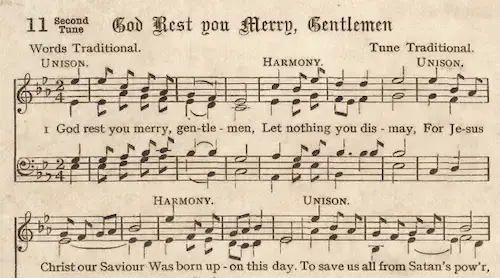‘God rest you (or ye) merry gentlemen’ means ‘Gentlemen, may god keep you in harmony and happiness’.
The expression is no longer used other than as the title and first line of the popular Christmas Carol.
‘God rest you (or ye) merry gentlemen’ means ‘Gentlemen, may god keep you in harmony and happiness’.
The expression is no longer used other than as the title and first line of the popular Christmas Carol.
Apart from being the title of a carol, the expression ‘God rest you merry gentlemen’ is notable for being almost universally misunderstood.
A clue to a proper reading of the line is that the phrases ‘rest ye merry’ and ‘God rest ye merry’ were commonplace expressions of goodwill in Medieval England. ‘Rest ye merry’ was used as early as 1300, in Old English, in the popular romantic tale Floris and Blauncheflur.
A more readable version is found in the Latin dictionary Bibliotheca Eliotae, edited and published by the English Bishop Thomas Cooper in 1548:
Bee thou gladde: or joyfull, as the vulgare people saie Reste you mery.
The first time that ‘God rest you merry’ was put into print was also from a Latin translation, this time Nicholas Udall’s Floures for Latine Spekynge gathered oute of Terence:
Good felow god you saue, or o louynge frende god rest you mery.
[God save you good fellow, or loving friend, God rest you.]
The carol God Rest Ye Merry, Gentlemen was probably written in the Tudor era, but it wasn’t printed until 1760. And, sorry ladies, in Tudor England you didn’t often get a mention.
To grasp the meaning of ‘God rest you merry’ as understood by the Tudors we need to take the expression apart.
The meaning of ‘rest’ was then ‘keep; cause to continue’. ‘Merry’ meant ‘pleasant; harmonious; happy’.
What many people now understand by the expression is:
“Merry Gentlemen – let God grant you repose.”
What the carol’s writers had in mind was:
“Gentlemen [merry or otherwise], may God keep you in a pleasant state.”
So, how did the original meaning come to be changed? It’s all about a comma.
The proper placing of the comma is ‘God rest ye merry, gentlemen’.
The confusion arose when the carol was first published. This wasn’t until 1760, in a broadsheet and again around 1780 in the collection Three New Carols for Christmas:
God rest ye merry Gentlemen,
Let nothing you dismay,
Remember Jesus Christ our Saviour
Was born upon this Day.
By the late 18th century the Tudor expression ‘God rest ye merry’ had long since fallen out of use. It was a reasonable assumption that the people being addressed weren’t just gentlemen but merry gentlemen.
We may get it wrong, but it’s been part of Christmas tradition since 1760, and it’s not going to change now.
Other merry phrases:
Trend of god rest you merry gentlemen in printed material over time

A B C D E F G H I J K L M N O P Q R S T UV W XYZ
American Animals Australian Bible Body Colour Conflict Death Devil Dogs Emotions Euphemism Family Fashion Food French Horses ‘Jack’ Luck Money Military Music Names Nature Nautical Numbers Politics Religion Shakespeare Stupidity Entertainment Weather Women Work
Have you spotted something that needs updated on this page? We review all feedback we receive to ensure that we provide the most accurate and up to date information on phrases.